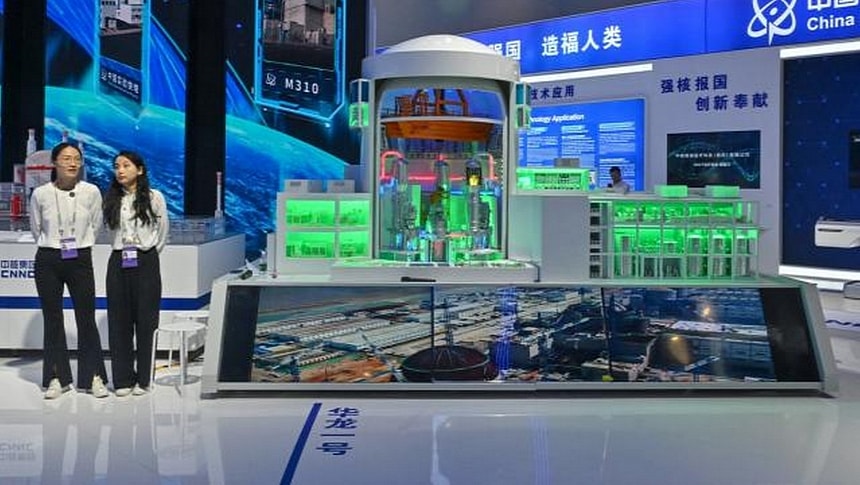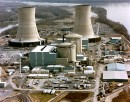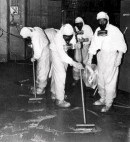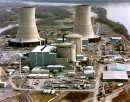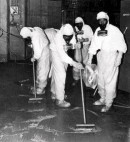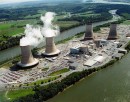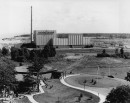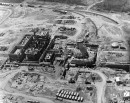Fukushima, Three Mile Island, and Chornobyl—these are the three lasting images that remain in the public eye when people think of commercial nuclear energy and the consequences that occur when things go wrong. But in China, a country hailed as a global superpower in nuclear research; one team claims to have plans to construct a power station so safe that it can rightfully be called meltdown-proof. At least, that's the claim.
With lessons learned from past nuclear meltdowns, the team at Tsinghua University in the Haidian District of Beijing has unveiled plans for the construction and operation of what's touted as the safest commercial fission reactor ever designed. Using an entirely novel, in-house-developed plan for what's been dubbed a "pebble-bed reactor," small quantities of fissile fuel rather than the large fuel rods native to most commercial reactors allows for the maximum amount of thermal energy capture out of a comparatively small load of fissile fuel.
No larger in size than the average cue ball, these tiny fissile fuel kernels are fueled not by light water, heavy water, or both, like most reactors. Instead, super-chilled helium gas on the knife edge of liquidation eliminates the possibility of a steam-based pressure buildup or void coefficient issue, as happened with Chornobyl's Reactor 4 or Three Mile Island's Reactor 2. Using a state-of-the-art array of computers, sensors, and AI programs, this tentative reactor design has the ability to detect, compensate for, and ultimately neutralize phenomena that might lead to meltdown conditions if left unchecked before personnel are even aware of a coming issue.
But even deeper than active thermal management, Chinese media touts the very construction materials that make up this pebble-bed reactor design could tolerate far higher base operating temperatures than typical fission reactors. With the reactor core designed to withstand up to 950C (1,742F), very nearly the re-entry speeds of a spacecraft plunging through the earth's atmosphere, the novel hydrogen cooling system ensures that even if all else fails, the level of fissile reaction occurring inside can be lowered via automation software or by on-site staff to come as close to truly meltdown proof as is currently possible with modern technology.
That said, this doesn't mean the potential for other forms of nuclear accidents isn't possible. Whether through coolant leaks exposing personnel to radiation, accidents involving maintenance of the reactor, and various general workplace hazards inherent to power stations still mean a fully-staffed team of engineers will still have to monitor the reactor at all times, even with computer assistants. Even so, the prospects of a nuclear reactor that's nearly physically incapable of melting down would do wonders for public sentiment around commercial fission. Assuming everything that's being claimed turns out to be accurate, of course.
No larger in size than the average cue ball, these tiny fissile fuel kernels are fueled not by light water, heavy water, or both, like most reactors. Instead, super-chilled helium gas on the knife edge of liquidation eliminates the possibility of a steam-based pressure buildup or void coefficient issue, as happened with Chornobyl's Reactor 4 or Three Mile Island's Reactor 2. Using a state-of-the-art array of computers, sensors, and AI programs, this tentative reactor design has the ability to detect, compensate for, and ultimately neutralize phenomena that might lead to meltdown conditions if left unchecked before personnel are even aware of a coming issue.
But even deeper than active thermal management, Chinese media touts the very construction materials that make up this pebble-bed reactor design could tolerate far higher base operating temperatures than typical fission reactors. With the reactor core designed to withstand up to 950C (1,742F), very nearly the re-entry speeds of a spacecraft plunging through the earth's atmosphere, the novel hydrogen cooling system ensures that even if all else fails, the level of fissile reaction occurring inside can be lowered via automation software or by on-site staff to come as close to truly meltdown proof as is currently possible with modern technology.
That said, this doesn't mean the potential for other forms of nuclear accidents isn't possible. Whether through coolant leaks exposing personnel to radiation, accidents involving maintenance of the reactor, and various general workplace hazards inherent to power stations still mean a fully-staffed team of engineers will still have to monitor the reactor at all times, even with computer assistants. Even so, the prospects of a nuclear reactor that's nearly physically incapable of melting down would do wonders for public sentiment around commercial fission. Assuming everything that's being claimed turns out to be accurate, of course.
